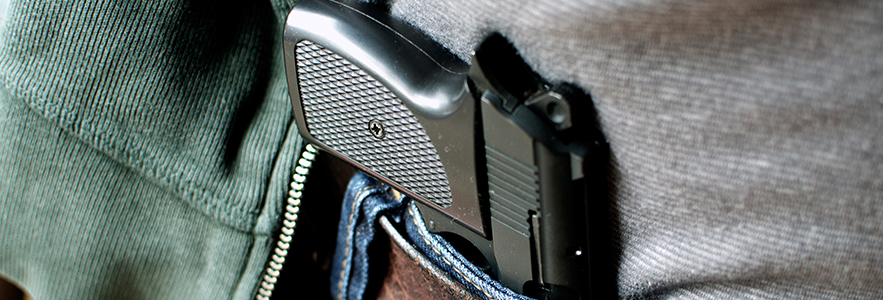Pennsylvania Firearms and Deadly Weapons Offense Attorney

The Second Amendment to the United States Constitution (1791) provides: “A well regulated Militia, being necessary to the security of a free State, the right of the people to keep and bear Arms, shall not be infringed.”
Despite the protections of the Second Amendment to the United States Constitution, the right of American citizens to “keep and bear Arms” is not unlimited. In the Commonwealth of Pennsylvania, several statutes in Chapter 61 of the Crimes Code regulate the possession and use of firearms including, without limitation:
A firearms or deadly weapons offense conviction can result in lengthy incarceration, large fines and other negative consequences
In general, a person who has been convicted of a felony offense within or without the Commonwealth of Pennsylvania, regardless of the length of the sentence, is prohibited from owning or possessing a firearm in Pennsylvania. The types of offenses that disqualify a person from possessing, using, manufacturing, controlling, selling or transferring firearms are listed in 18 PS 6105 (b). It is unlawful for a person to carry a concealed weapon without a license.
Any person who carries a firearm in any vehicle or concealed on his person without a valid and lawfully issued license commits a felony of the third degree (maximum of 7 years imprisonment and/or $15,000 fine), unless he did so in his place of abode or fixed place of business. If the person was eligible to possess a license and has not committed any other criminal violation, the crime committed is a misdemeanor of the first degree (maximum of 5 years imprisonment and/or $10,000 fine). It also is unlawful for any person to possess a firearm which has had the manufacturer’s serial number integral to the frame or receiver altered, changed, removed or obliterated. A violation of this offense (18 PS 6110.2) is a felony of the second degree (maximum of 10 years imprisonment and/or $25,000 fine).
Another prohibition concerns the use of certain bullets for weapons. In Pennsylvania, it is unlawful for any person to possess, use or attempt to use a KTW teflon-coated bullet or other armor piercing ammunition while committing or attempting to commit a crime of violence. An offense under this section constitutes a felony of the third degree (maximum of 7 years imprisonment and/or $15,000 fine).
What follows a violation of any of the above-listed firearms and deadly weapons offenses?
A violation of any of the above-listed offenses or those appearing in Chapter 61 of the Pennsylvania Crimes Code may carry with it a lengthy term of imprisonment and substantial fines. Further, the use of a deadly weapon during the commission of a crime can increase the length of incarceration in prison as a result of “deadly weapon enhancements” that may apply to the sentence.
If a deadly weapon was possessed during the commission of a crime, the “Deadly Weapon Enhancement/Possessed Matrix” appearing in 204 Pa.Code 303.17(a) may be utilized to increase the length of incarceration. If a deadly weapon actually was used in the offense, an even greater period of incarceration may apply as a result of the “Deadly Weapon Enhancement/Used Matrix” appearing in 204 Pa.Code 303.17(b).
Trust the Skillful and Experienced Trial Attorneys at Charles Law Offices to help you with your firearms or deadly weapons offense case
If you are arrested and charged with a firearms or deadly weapons offense, it is vitally important that you secure trained and experienced trial counsel as soon as possible so that all of your federal and state constitutional and legal rights are protected, and your chances for achieving a favorable outcome are maximized.
Since the 1970’s, Attorneys Fredrick E. Charles and Dennis G. Charles of the Charles Law Offices have zealously and effectively guarded the legal rights and interests of people arrested and charged with firearms or deadly weapons offenses. Their excellent legal training, pretrial preparation, trial and appellate skills, coupled with their access to, and use of, the finest forensic experts in the field, have enabled them for almost 40 years to achieve successful outcomes for people charged with firearms and deadly weapons offenses.
If you, or a loved one, have been arrested and charged with a firearms or deadly weapons offense, the lawyers at Charles Law Offices will protect all of your federal and state constitutional and legal rights throughout all stages of the criminal prosecution, including the preliminary arraignment and bail hearing before the magisterial district justice, the preliminary hearing, status conferences, the omnibus pretrial motion hearing, jury selection, trial by jury (or judge), and appeal, if necessary.”
Trust the legal knowledge, training, trial skills, and unrivaled experience of Attorneys Fredrick E. Charles and Dennis G. Charles of the Charles Law Offices to carefully analyze your case and zealously represent and defend your legal interests at the highest level.
Disclaimer: While every effort has been made to ensure the accuracy of this publication, it is not intended to provide legal advice as individual situations will differ and should be discussed with a lawyer. For specific technical or legal advice on the information provided and related topics, please contact the attorneys at Charles Law Offices.
A Family History of Devotion to
Law and Public Service
Law and Public Service
The Charles Brothers’ devotion to the law is derived from a family history in the legal system and of service to others. Their father, Charles “Chink” Charles (depicted in the lower left-hand corner of the photograph) held a 35 year career in law enforcement, and was selected to serve as the personal bodyguard for former United States Presidents John F. Kennedy, Richard M. Nixon and Lyndon B. Johnson during their campaign visits to Allentown.






